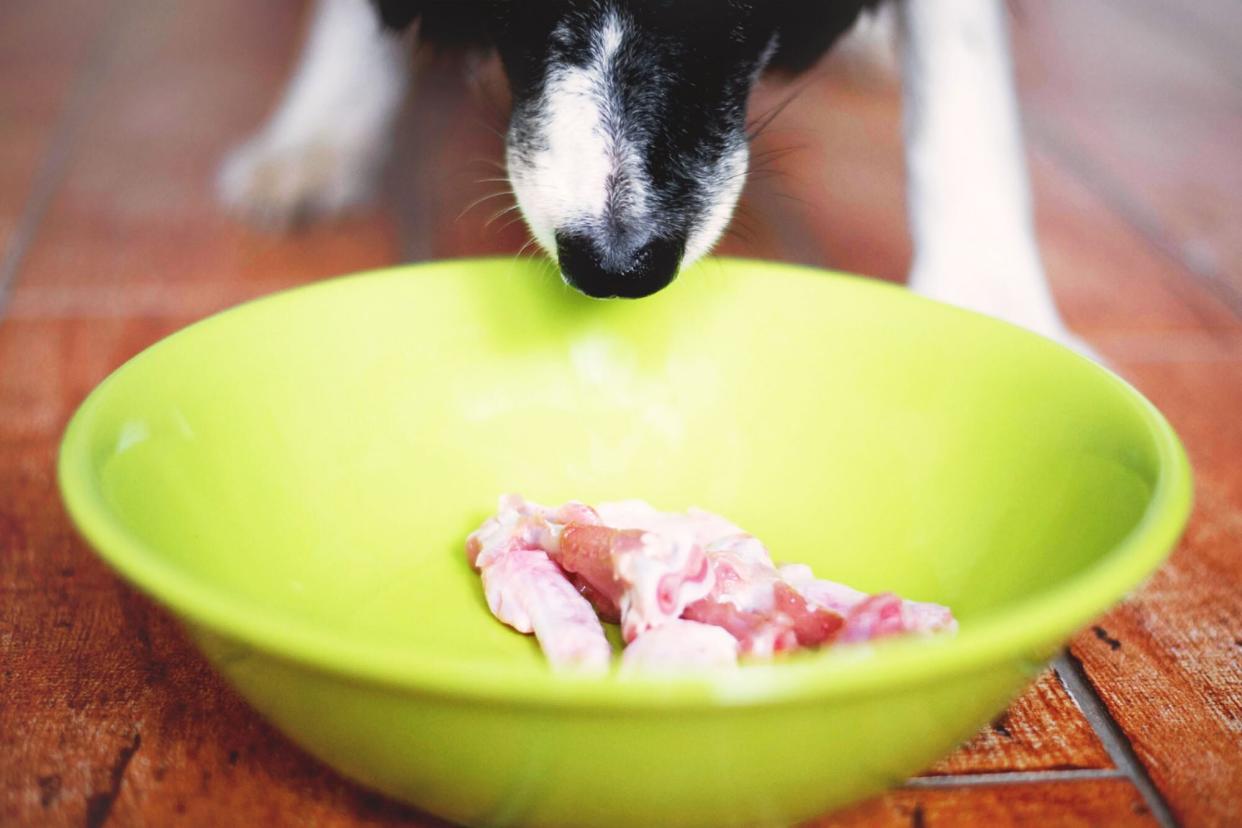Can Dogs Eat Raw Chicken? Probably Not

Dvorakova Veronika / Adobe Stock
Dogs have earned a reputation for being endearingly uncritical. And while this approach to life serves them well in maintaining the human-animal bond, it isn't always helpful when it comes to their diet.
For example, you've probably noticed that dogs aren't the sort of creatures to turn up their noses at meat in any form—whether it's good for them or not. So it's up to us as pet parents to be the critical ones to ensure their meals aren't just palatable, but safe, as well. Unfortunately, this is often easier said than done.
Case in point: whether or not raw chicken is safe for your dog to eat. You've likely heard some mixed messages on the topic, so we've asked Board Certified Veterinary Nutritionist Laura Gaylord, DVM, DACVIM (Nutrition), owner of Whole Pet Provisions, PLLC, to share her expert take.
Is Raw Chicken Safe for Dogs? What Are the Dangers?
According to Gaylord, the reason why raw chicken isn't safe for humans and the reason why it isn't safe for dogs are one and the same: the risk of foodborne illness. "Feeding any raw proteins can expose your dog to bacterial pathogens that cause gastrointestinal illness, including salmonella, clostridium, and listeria," she explains.
And contrary to popular belief, your pup isn't impervious to these pathogens. "Some may argue that a dog's intestinal tract is set up differently to process raw foods so that they're less likely to become sick from these bacteria," Gaylord notes. "However, there's documented illness from these infections." For example, the Centers for Disease Control and Prevention (CDC) notes that dogs infected with salmonella can experience diarrhea, lethargy, fever, and vomiting.
The fact that some of these pathogens are zoonotic, meaning they can be passed from animals to humans, adds further gravity to the topic. Returning to the example of salmonella, the CDC says that a dog infected with the bacteria can shed infectious germs in their poop for 4 to 6 weeks. Making matters more difficult, your dog may show zero signs of illness during this time, and without careful cleaning and safety protocols in place, you or someone else in your household can become infected and seriously ill.
Finally, there's one more danger to discuss: bones. Despite being a pervasive pairing in popular culture, dogs and bones are a hazardous combination, Gaylord says. Bones are difficult (and sometimes impossible) to digest and can also break into sharp, dagger-like shards. Serving your dog raw meat that's still connected to the bone (e.g. bone-in chicken breasts, thighs, wings, legs) can lead to choking, gastrointestinal injury (such as stomach punctures), intestinal blockage, and teeth fractures, in addition to bacterial disease.
RELATED: Can Cats Eat Raw Chicken? Everything You Need to Know Before Feeding your Feline Raw Meat
Are There Any Benefits to Feeding Raw Chicken to Dogs?
When it comes to feeding your dog raw chicken, the potential benefits don't outweigh the potential risks. "There's no scientific evidence to support the belief that raw food is healthier for your dog than food that's cooked," Gaylord explains. "Some benefits, such as increased digestibility and improvements in hair coat and skin quality have been noted with less processed diets, but this includes both cooked and raw diets."
Unfortunately, Gaylord says that most of the current studies looking at the possible benefits of feeding pets raw food are limited in scientific power (e.g. case reports about individual dogs, survey responses from pet owners), making it impossible to know the true benefits, if any, at this time.
What to Do if Your Dog Eats Raw Chicken
Dogs sadly tend to find all of the aforementioned dangers unconvincing and may still try to snag a piece of raw chicken from your countertop or trash. If yours succeeds, Gaylord recommends monitoring your dog for gastrointestinal signs like vomiting and diarrhea for the next several days. And if that stolen chicken included bones, she says it's a good idea to call your vet so they can help you assess the risk of gastrointestinal injury.
"At minimum," Gaylord continues, "more intense monitoring is usually suggested along with radiographs to be sure the bone digests over time or passes safely through the gastrointestinal tract if it's small enough. Endoscopic or surgical removal may be recommended for large or sharp bony objects."
If you're interested in adding cooked, boneless chicken to your dog's diet, visit your veterinarian or a board-certified veterinary nutritionist. They can give you tips on the safest way to serve chicken and can help you develop a comprehensive plan that ensures your dog gets the nutrients they need.
RELATED: What to Do if Your Dog Eats Something Weird (and Possibly Dangerous)

